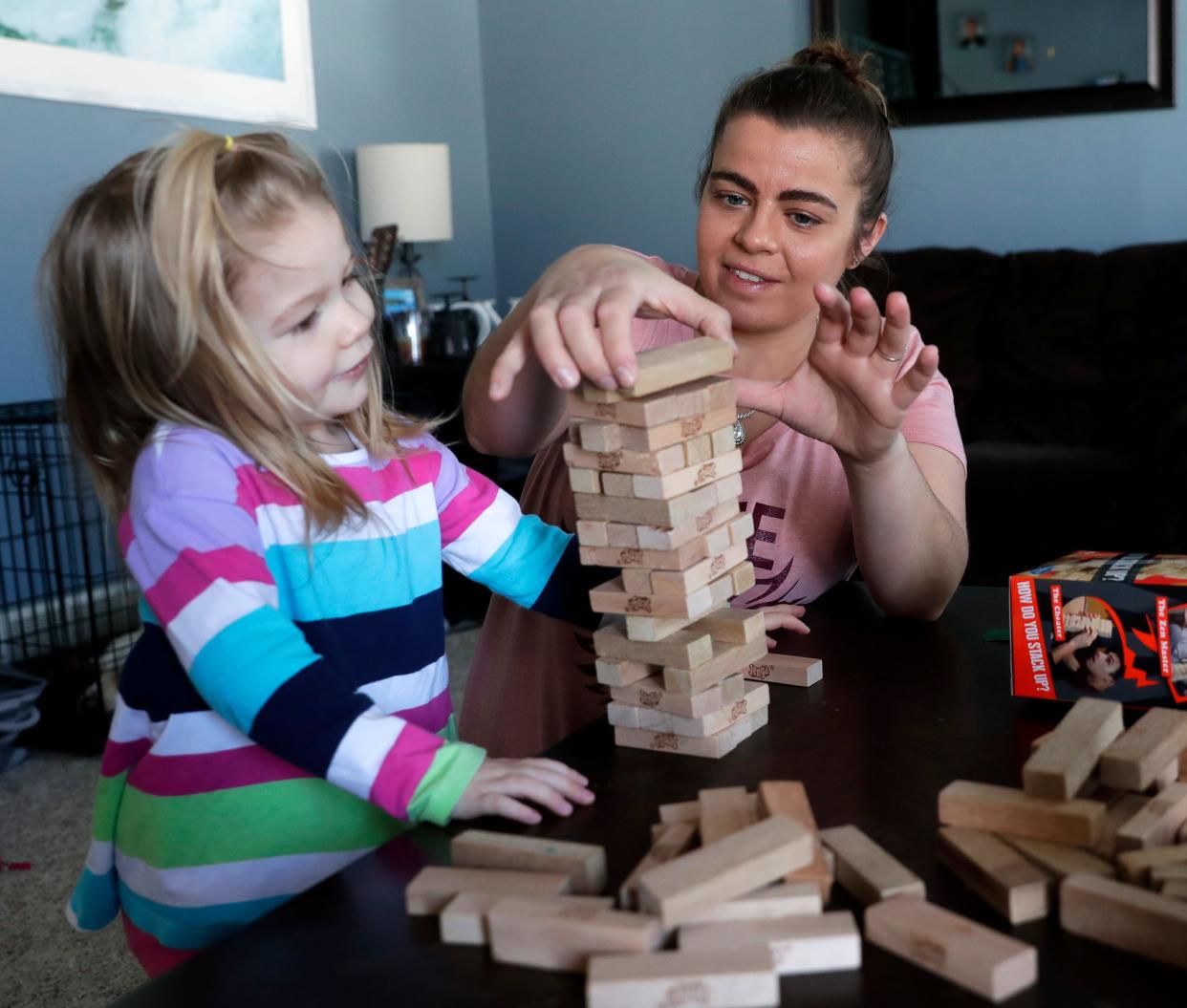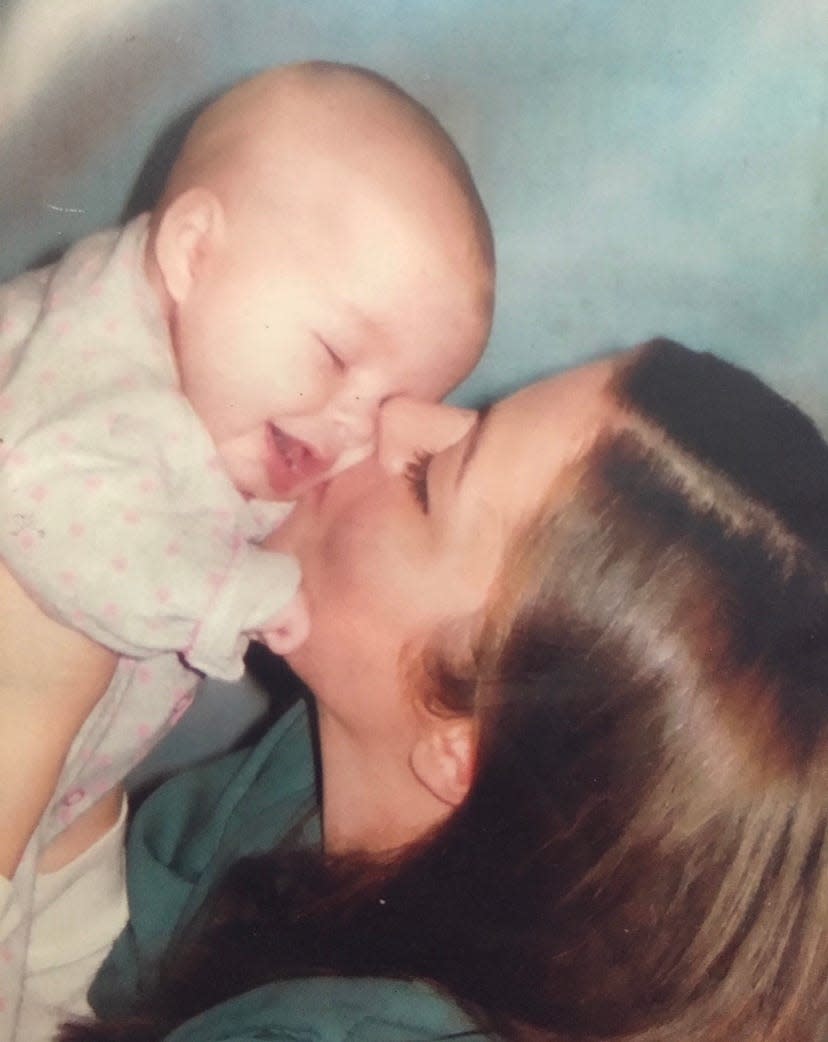A Wisconsin prison induced her labor against her will. Now she wants to improve maternal care for incarcerated women.

- Oops!Something went wrong.Please try again later.
Cheri Branham hoped her first child would share her birth date. The due date, after all, was the day before Branham’s birthday.
But the day of her child's birth wasn’t up to Branham.
It ultimately was decided by the Wisconsin Department of Corrections. Pregnant women in the DOC’s care often have their labor medically induced.
Branham was one of them.
“I did not have an option,” Branham said, who, in 2014, was in Taycheedah Correctional Institution for a rule violation.
Her probation was revoked when she sought medical treatment for substance abuse after learning she was pregnant. Authorities considered that a violation -- getting prescribed medication without her probation officer's consent.
She was sent back to prison while six months pregnant.
What was supposed to be a joyous event was filled with fear and uncertainty when prison guards came to her cell at 4 a.m. to take her to a Green Bay hospital to give birth to her now 8-year-old daughter. Branham felt alone and isolated, despite being surrounded by prison guards.
She had no time to call anyone. Not even her mother.
“This was my first birth. I didn’t know what was going on. I had no preparation. I had no family,” Branham said. “It was very terrifying. Nobody shouldn’t have to go through that at all.”

This new bill could lead to doulas helping women who are incarcerated
Branham, 32, of Howard, is lending her voice to support proposed legislation to ensure pregnant women in the DOC’s care receive better maternal healthcare.
The Dignity for Incarcerated Women and Girls bill seeks to create the Wisconsin Doula Prison Project. The project would allow trained doula practitioners to provide support for birthing women and individuals before, during and after delivery in state prisons. The bill also seeks to ban the practice of shackling pregnant and postpartum individuals in the DOC’s care.
State Sen. Lena Taylor and state Rep. Jodi Emerson are sponsoring the bill. Taylor and Emerson, both Democrats, announced it earlier this month during a news conference in Madison.
Women comprise 6.5 percent of the state’s prison population of 20,000, according to DOC figures. Six of the 800 women housed at Taycheedah gave birth last year, according to a DOC spokesperson.
“Women come into the system pregnant all the time,” said Peggy A. West-Schroder, executive director of FREE, a statewide advocacy nonprofit led by and for justice-impacted women. Her organization is part of a coalition pushing for the bill’s passage.
“It is the system’s responsibility to care for them and their infant. Up until this point, there hasn’t been a lot of attention to this subject," said West-Schroder, whose mother gave birth to her while in DOC custody.
Wisconsin's prison doula project would mirror a similar effort in Minnesota. There, the doulas provide a continuum of care for expectant mothers throughout their pregnancies, visiting moms while incarcerated and accompanying them to the birth. Doulas provide parenting and prenatal classes as well as follow-up care after the mother is released. The Minnesota program also created a designated lactation room in the state's only women’s prison.
Having a prison doula program for expecting mothers provides not only a support system, but empowers them also, said Erica Gerrity, who founded the Minnesota Prison Doula Project in 2010, but now lives in Wisconsin.
Most incarcerated women have experienced trauma and abuse in their lives, including sex trafficking, she said. That trauma continues when placed in a carceral system that controls a woman’s every move down to when she gives birth, noted Gerrity, executive director, of the Ostara Initiative, a nonprofit supporting justice-involved parenting and pregnant people.
“A lot of prisons and jails chose inductions; they chose when you will have your baby,” she said. “The truth is you can make decisions about your body even if you are incarcerated.”
More:'Art Against the Odds' shows works made by prisoners in Wisconsin
Doulas provide three things -- emotional, informational, and physical support, said Gerrity, a trained doula.
They connect expecting moms with resources, help them determine where their baby would be placed, assist with that initial separation from their infants in the hospital and help them find the joy in their child’s birth even though they are incarcerated.
Doulas are becoming the standard of practice for pregnant incarcerated people, she said. Her nonprofit, over the next five years, plans to establish five doula projects in federal prisons. For now, Gerrity wants to reach out to justice-involved women in the state who gave birth while in DOC’s care to help facilitate this work.
"If we want people to grow and heal and change … we need to have supportive programs like doula care," Gerrity said.
“Having a support person would have made the process easier,” said Branham, who suffered a mental breakdown once she returned to prison. “I had severe postpartum and was suicidal.”
The only thing that saved her was the promise her mom made to bring the baby daughter to the prison. But the experience led Branham, now a married mother of four, to get a degree in social work and to become a doula herself.
“The advocacy is huge,” Branham said. “While a doula doesn't give medical advice, our main role is to support and to make sure the person gets what they want. Those women don’t have anyone advocating for them at that point. They are alone.”
The benefits of a doula program are huge. She said studies show improved birth weight, low infant mortality, and improved mental health outcomes for mothers.
The DOC currently doesn't shackle pregnant women in labor, except when the safety of mother or child is at issue, West-Schroder said. The bill aims to codify banning shackling altogether, so it cannot be discretionary, she said.
"We are just asking them to make it a law, so the next DOC secretary can’t come in and change that,” West-Schroder said. “There are many states across the U.S. that have outlawed the shackling of pregnant women. Let’s not be that state left on the books, where we shackle pregnant women.”
Funding for the program could come from grants. The cost, West-Schroder said, would be minimal to DOC other than the additional staff time needed to monitor when the mother goes into labor naturally.
This is Taylor’s second attempt to pass an anti-shackling bill. She introduced a similar measure in 2019, but it failed to get out of committee, as did a similar 2017 bill. Taylor is hopeful this time around.
She said there’s more awareness about doulas and the role they play in improving birth outcomes. She noted the state’s infant mortality rate is high, especially among Black mothers.
More:Wisconsin's policy barring clergy from visiting inmates over COVID-19 is ruled unconstitutional
Since more jails statewide have begun implementing anti-shackling policies, there’s data that shows this is not a security issue, she said. Pregnant women in the throes of labor don’t pose a flight risk, she added.
“I don’t think that is a thing we have to be concerned about,” Taylor said. “I don’t believe we have to create that additional inhumanity and trauma for that newborn and that mother.”
She hopes the legislature would “err on the side of dignity and decency.”
La Risa Lynch is a community affairs reporter for the Milwaukee Journal Sentinel. Email her at llynch@gannett.com
This article originally appeared on Milwaukee Journal Sentinel: Wisconsin prison induced her labor; now she fights for new law

